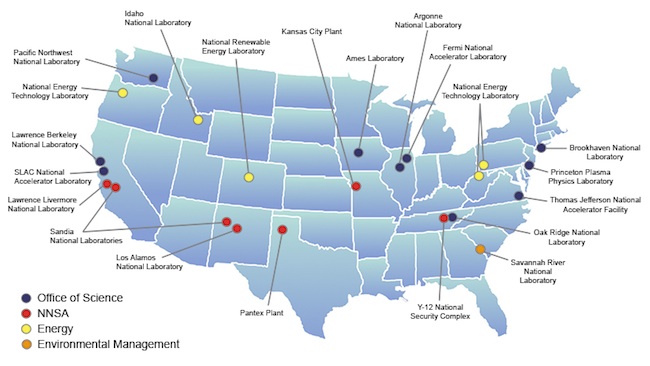
The Department of Energy’s network of 17 national laboratories and five related facilities has been responsible for a multitude of materials science and other innovations since World War II. Now Washington think tanks, Congressional leaders, and the new Secretary of Energy are beginning to look at how possible reforms to the labs’ structure and management could bring them into the 21st century and facilitate transfer of lab-developed technologies to industry to boost the US economy.
A joint report (pdf) from three ideologically disparate think tanks—the Information Technology and Innovation Foundation, the Heritage Foundation, and the Center for American Progress—got the reform ball rolling in June. Ernest Moniz, a nuclear physicist who became energy secretary in May, drafted a letter in response to a query from the US House of Representatives’ Energy Subcommittee expressing his willingness to consider reforms, and last week the subcommittee held a hearing on the matter.
Secretary of Energy Ernest Moniz. Credit: DOE
The report, entitled Turning the Page: Reimagining the National Labs in the 21st Century Innovation Economy, makes several recommendations on how the lab network could be improved to address changing scientific and technological challenges and promote closer ties to industry to move technologies from the basic research to the industrial implementation phase.
The national laboratories manage more than $10 billion of scientific and national security activities, according to the report, which says: “…As the nature of technology and the needs of the nation have evolved, the lab management and stewardship model has failed to keep pace. This report proposes a series of pragmatic nonpartisan policy reforms needed to ensure the labs remain effective and continue to deliver national benefits to the taxpayers.
“The working group’s policy reforms described herein have three main goals:
- Increasing the effectiveness of each dollar spent on research to get the greatest benefit to taxpayers,
- Ensuring that labs are well positioned to leverage private-sector investment in serving the national interest,
- Making lab research more nimble, relevant, and accessible to public and private interests.”
More timely and efficient transfer of lab-developed technologies to the market is one of the key drivers of the reform movement. The report also suggests allowing labs to charge the market rate, rather than cost recovery, for services; merging the existing Offices of Science, Energy Efficiency and Renewable Energy, Fossil Energy, and Nuclear into a new Office of Science and Technology, which would coordinate all research functions; eliminating top-down overhead accounting rules; expanding DOE’s Agreements for Commercializing Technology program, and creating a high-level task force that would be aimed at giving the labs greater authority to manage themselves and developing better technology-transfer metrics.

